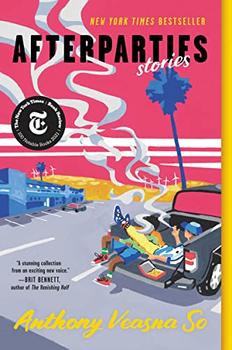Summary | Excerpt | Reading Guide | Reviews | Beyond the book | Read-Alikes | Genres & Themes | Author Bio

Fiction
by Jocelyn Nicole JohnsonA young woman descended from Thomas Jefferson and Sally Hemings driven from her neighborhood by a white militia. A university professor studying racism by conducting a secret social experiment on his own son. A single mother desperate to buy her first home even as the world hurtles toward catastrophe. Each fighting to survive in America.
Tough-minded, vulnerable, and brave, Jocelyn Nicole Johnson's precisely imagined debut explores burdened inheritances and extraordinary pursuits of belonging. Set in the near future, the eponymous novella, "My Monticello," tells of a diverse group of Charlottesville neighbors fleeing violent white supremacists. Led by Da'Naisha, a young Black descendant of Thomas Jefferson and Sally Hemings, they seek refuge in Jefferson's historic plantation home in a desperate attempt to outlive the long-foretold racial and environmental unravelling within the nation.
In "Control Negro," hailed by Roxane Gay as "one hell of story," a university professor devotes himself to the study of racism and the development of ACMs (average American Caucasian males) by clinically observing his own son from birth in order to "painstakingly mark the route of this Black child too, one whom I could prove was so strikingly decent and true that America could not find fault in him unless we as a nation had projected it there." Johnson's characters all seek out home as a place and an internal state, whether in the form of a Nigerian widower who immigrates to a meager existence in the city of Alexandria, finding himself adrift; a young mixed-race woman who adopts a new tongue and name to escape the landscapes of rural Virginia and her family; or a single mother who seeks salvation through "Buying a House Ahead of the Apocalypse."
United by these characters' relentless struggles against reality and fate, My Monticello is a formidable book that bears witness to this country's legacies and announces the arrival of a wildly original new voice in American fiction.
The end of the story shouldn't be spoiled, but "Control Negro" is a powerful, exceedingly dark demonstration of how the wounds of racial injustice trickle down from one generation to the next. The second half of the book consists of the eponymous novella, a story about a young Black woman named Da'Naisha escaping with her boyfriend and some neighbors from a violent uprising of white nationalists in Virginia. "My Monticello" unfolds as a dramatic and well-executed survival plot, but the story's most intriguing element is its thematic consideration of ownership and inheritance...continued
Full Review
(659 words)
This review is available to non-members for a limited time. For full access,
become a member today.
(Reviewed by Lisa Butts).
 In the novella that makes up the second half of My Monticello, survivors of a white nationalist uprising seek shelter at Thomas Jefferson's estate. Jefferson's former residence and plantation located just outside of Charlottesville, Virginia is a UNESCO World Heritage Site and currently operates as a museum dedicated to the third U.S. president by the Thomas Jefferson Foundation. However, Jefferson's legacy as a founding father is complicated by his history as a slaveholder, despite his referring to slavery as a "moral depravity" and crafting legislation banning the import of enslaved Africans to Virginia. It is believed that Jefferson was the father of six children with an enslaved woman named Sally Hemings, who lived with and labored ...
In the novella that makes up the second half of My Monticello, survivors of a white nationalist uprising seek shelter at Thomas Jefferson's estate. Jefferson's former residence and plantation located just outside of Charlottesville, Virginia is a UNESCO World Heritage Site and currently operates as a museum dedicated to the third U.S. president by the Thomas Jefferson Foundation. However, Jefferson's legacy as a founding father is complicated by his history as a slaveholder, despite his referring to slavery as a "moral depravity" and crafting legislation banning the import of enslaved Africans to Virginia. It is believed that Jefferson was the father of six children with an enslaved woman named Sally Hemings, who lived with and labored ...
This "beyond the book" feature is available to non-members for a limited time. Join today for full access.

If you liked My Monticello, try these:

by Anthony Veasna So
Published 2022
A vibrant story collection about Cambodian-American life - immersive and comic, yet unsparing - that offers profound insight into the intimacy of queer and immigrant communities.

The Office of Historical Corrections
by Danielle Evans
Published 2021
The award-winning author of Before You Suffocate Your Own Fool Self brings her signature voice and insight to the subjects of race, grief, apology, and American history.
We have to abandon the idea that schooling is something restricted to youth...
Click Here to find out who said this, as well as discovering other famous literary quotes!